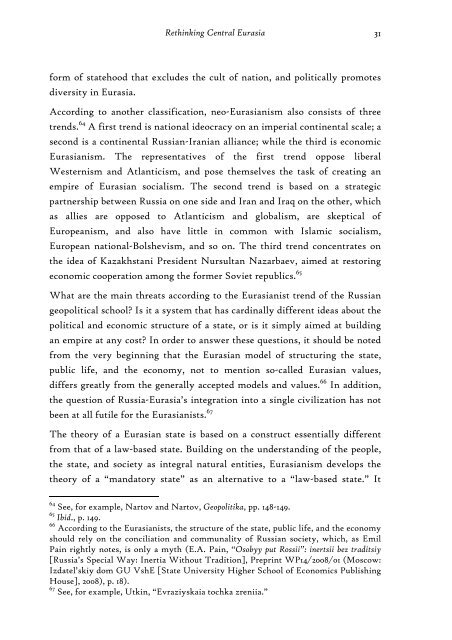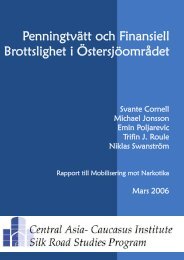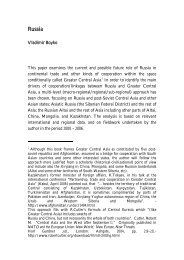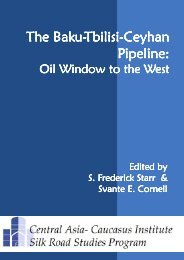Eurasianism and the Concept of Central Caucaso-Asia
Eurasianism and the Concept of Central Caucaso-Asia
Eurasianism and the Concept of Central Caucaso-Asia
You also want an ePaper? Increase the reach of your titles
YUMPU automatically turns print PDFs into web optimized ePapers that Google loves.
Rethinking <strong>Central</strong> Eurasia 31<br />
form <strong>of</strong> statehood that excludes <strong>the</strong> cult <strong>of</strong> nation, <strong>and</strong> politically promotes<br />
diversity in Eurasia.<br />
According to ano<strong>the</strong>r classification, neo-<strong>Eurasianism</strong> also consists <strong>of</strong> three<br />
trends. 64 A first trend is national ideocracy on an imperial continental scale; a<br />
second is a continental Russian-Iranian alliance; while <strong>the</strong> third is economic<br />
<strong>Eurasianism</strong>. The representatives <strong>of</strong> <strong>the</strong> first trend oppose liberal<br />
Westernism <strong>and</strong> Atlanticism, <strong>and</strong> pose <strong>the</strong>mselves <strong>the</strong> task <strong>of</strong> creating an<br />
empire <strong>of</strong> Eurasian socialism. The second trend is based on a strategic<br />
partnership between Russia on one side <strong>and</strong> Iran <strong>and</strong> Iraq on <strong>the</strong> o<strong>the</strong>r, which<br />
as allies are opposed to Atlanticism <strong>and</strong> globalism, are skeptical <strong>of</strong><br />
Europeanism, <strong>and</strong> also have little in common with Islamic socialism,<br />
European national-Bolshevism, <strong>and</strong> so on. The third trend concentrates on<br />
<strong>the</strong> idea <strong>of</strong> Kazakhstani President Nursultan Nazarbaev, aimed at restoring<br />
economic cooperation among <strong>the</strong> former Soviet republics. 65<br />
What are <strong>the</strong> main threats according to <strong>the</strong> Eurasianist trend <strong>of</strong> <strong>the</strong> Russian<br />
geopolitical school? Is it a system that has cardinally different ideas about <strong>the</strong><br />
political <strong>and</strong> economic structure <strong>of</strong> a state, or is it simply aimed at building<br />
an empire at any cost? In order to answer <strong>the</strong>se questions, it should be noted<br />
from <strong>the</strong> very beginning that <strong>the</strong> Eurasian model <strong>of</strong> structuring <strong>the</strong> state,<br />
public life, <strong>and</strong> <strong>the</strong> economy, not to mention so-called Eurasian values,<br />
differs greatly from <strong>the</strong> generally accepted models <strong>and</strong> values. 66 In addition,<br />
<strong>the</strong> question <strong>of</strong> Russia-Eurasia’s integration into a single civilization has not<br />
been at all futile for <strong>the</strong> Eurasianists. 67<br />
The <strong>the</strong>ory <strong>of</strong> a Eurasian state is based on a construct essentially different<br />
from that <strong>of</strong> a law-based state. Building on <strong>the</strong> underst<strong>and</strong>ing <strong>of</strong> <strong>the</strong> people,<br />
<strong>the</strong> state, <strong>and</strong> society as integral natural entities, <strong>Eurasianism</strong> develops <strong>the</strong><br />
<strong>the</strong>ory <strong>of</strong> a “m<strong>and</strong>atory state” as an alternative to a “law-based state.” It<br />
64<br />
See, for example, Nartov <strong>and</strong> Nartov, Geopolitika, pp. 148-149.<br />
65<br />
Ibid., p. 149.<br />
66<br />
According to <strong>the</strong> Eurasianists, <strong>the</strong> structure <strong>of</strong> <strong>the</strong> state, public life, <strong>and</strong> <strong>the</strong> economy<br />
should rely on <strong>the</strong> conciliation <strong>and</strong> communality <strong>of</strong> Russian society, which, as Emil<br />
Pain rightly notes, is only a myth (E.A. Pain, “Osobyy put Rossii”: inertsii bez traditsiy<br />
[Russia’s Special Way: Inertia Without Tradition], Preprint WP14/2008/01 (Moscow:<br />
Izdatel’skiy dom GU VshE [State University Higher School <strong>of</strong> Economics Publishing<br />
House], 2008), p. 18).<br />
67<br />
See, for example, Utkin, “Evraziyskaia tochka zreniia.”






